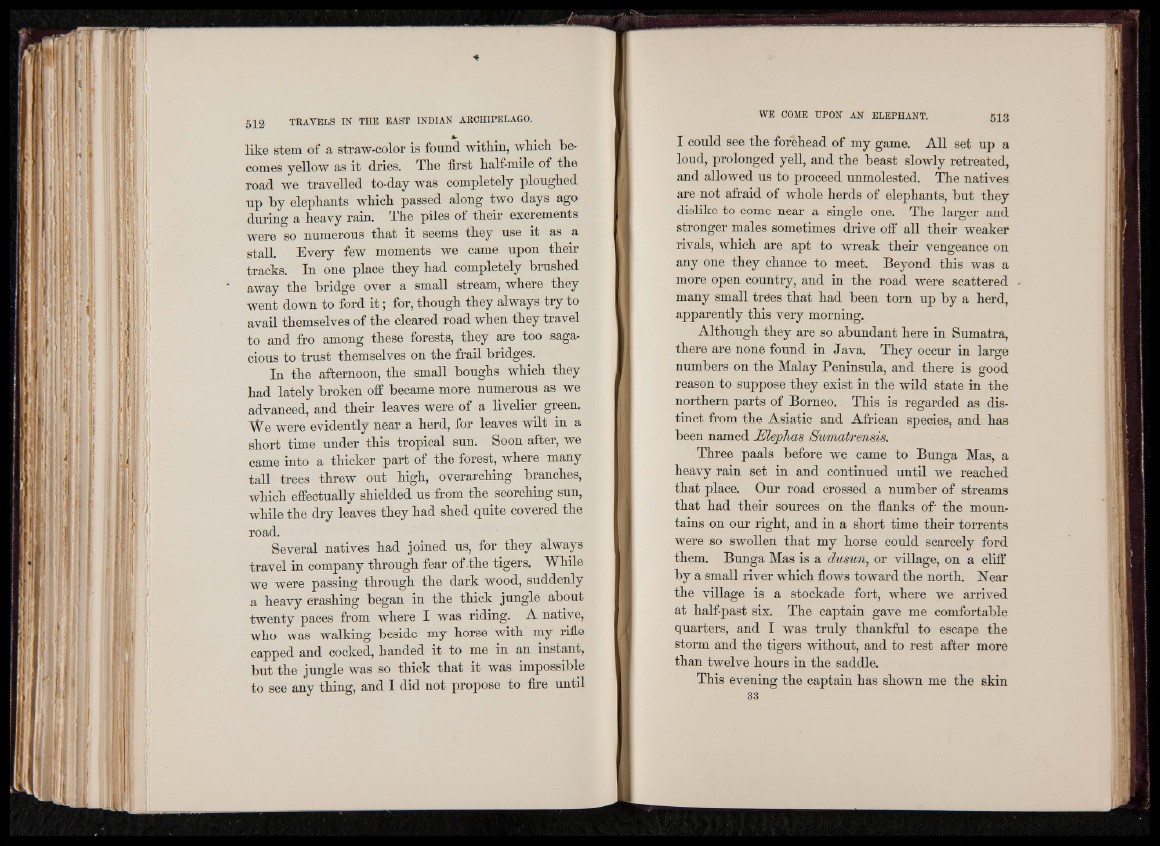
like stem of a straw-color is found within, which becomes
yellow as it dries. The first half-mile of the
road we travelled to-day was completely ploughed
up by elephants which passed along two days ago
( h i r i n g a heavy ram. The piles of their excrements
were so numerous that it seems they use it as a
stall. Every few moments we came upon their
tracks. In one place they had completely brushed
away the bridge over a small stream, where they
went down to ford i t ; for, though they always try to
avail themselves of the cleared road when they travel
to and fro among these forests, they are too sagacious
to trust themselves on the frail bridges.
In the afternoon, the small boughs which they
had lately broken off became more numerous as we
advanced, and their leaves were of a livelier green.
We were evidently near a herd, for leaves wilt in a
short time under this tropical sun. Soon after, we
came into a thicker part of the forest, where many
tall trees threw out high, overarching branches,
which effectually shielded us from the scorching sun,
while the dry leaves they had shed quite covered the
road.S
everal natives had joined us, for they always
travel in company through fear of-the tigers. While
we were passing through the dark wood, suddenly
a heavy crashing began in the thick jungle about
twenty paces from where I was riding. A. native,
who was walking beside my horse with my rifle
capped and cocked, handed it to me in an instant,
but the jungle was so thick that it was impossible
to see any thing, and I did not propose to fire until
I could see the forehead of my game. All set up a
loud, prolonged yell, and the beast slowly retreated,
and allowed us to proceed unmolested. The natives
are not afraid of whole herds of elephants, but they
dislike to come near a single one. The larger and
stronger males sometimes drive off all their weaker
rivals, which are apt to wreak their vengeance on
any one they chance to meet. Beyond this was a
more open country, and in the road were scattered
many small trees that had been torn up by a herd,
apparently this very morning.
Although they are so abundant here in Sumatra,
there are none found in Java. They occur in large
numbers on the Malay Peninsula, and there is good
reason to suppose they exist in the wild state in the
northern parts of Borneo. This is regarded as distinct
from the Asiatic and African species, and has
been named Elephas Sumatrensis.
Three paals before we came to Bunga Mas, a
heavy rain set in and continued until we reached
that place. Our road crossed a number of streams
that had their sources on the flanks of the mountains
on our right, and in a short time their torrents
were so swollen that my horse could scarcely ford
them. Bunga Mas is a dusun, or village, on a cliff
by a small river which flows toward the north. Near
the village is a stockade fort, where we arrived
at half-past six. The captain gave me comfortable
quarters, and I was truly thankful to escape the
storm and the tigers without, and to rest after more
than twelve hours in the saddle.
This evening the captain has shown me the skin
33